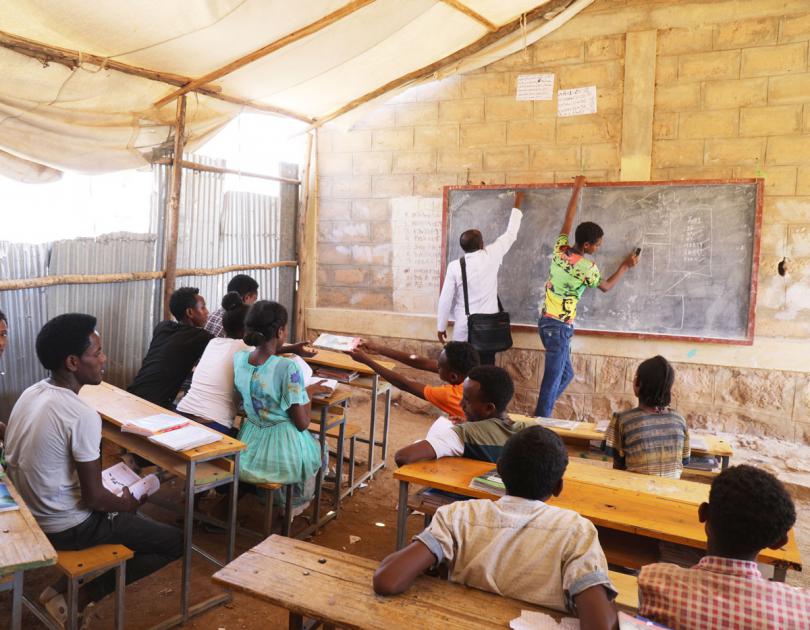From Displacement to Dreams: Woinishet’s Story

Story summary
Woinishet, a 15 year old girl, is currently in seventh grade at a primary school in the Amhara Region, specifically in the Sekota area. She resides with her four siblings and her parents in a small, rented house. Approximately three years ago, Woinishet and her family were forced to flee their home due to intense fighting that erupted in their village. Initially, they sought refuge in a nearby rural village, and later, they traveled to Sekota, where they found shelter in a camp for internally displaced people. During this challenging period, they received limited support from both the government and other humanitarian agencies.
Woinishet and other children in her village were forced to discontinue their education due to the ongoing conflict. Schools became direct targets during the fighting, resulting in significant damage to most educational institutions in the area. The impact of this destruction is still evident, as children now attend classes in overcrowded classrooms. Unfortunately, this situation has had a profound effect on their education.
Woinishet’s story in her own words (Quotes)
“My name is Woinishet, I am a fifteen-year-old with two older brothers and a sister. Currently, I am in the seventh grade at our local school. Prior to the conflict, my parents were merchants who conducted business here in town. During that time, our family enjoyed a decent life filled with happiness”.
English is my favorite subject in class. I appreciate English because it allows me to connect with people from all around the world. Additionally, I am aware that in the next level of school, all subjects will be taught in English. My proficiency helps me easily grasp the lessons provided.
Three years ago, my parents, siblings, and I were forced to flee our hometown. We traveled to a nearby village where we sought refuge in a relative’s house for nearly three months. Later, we moved to Sekota, where we became refugees at a camp for displaced persons. For over two years, we lived in a shelter with minimal possessions provided by supporters.
In the camp, we faced significant challenges. Food was scarce, and hunger was a constant companion. The cramped living conditions left us with insufficient space to sleep comfortably. Additionally, the camp’s sanitation was poor, and illness was a frequent occurrence.

Despite these hardships, we held onto hope and resilience, relying on each other for support. Our journey has been marked by struggle, but we remain determined to find safety and a better future.
During my time in the camp, I held a strong desire to resume my education. The war in our area had interrupted my studies, and I longed to continue learning. Unfortunately, when I applied to the local school, they informed me that their academic calendar had already progressed, making it challenging for me to catch up with my peers. Consequently, I had no choice but to put my education on hold for over two years.
Reflecting on this period, I can’t help but wonder how different things might have been if circumstances had allowed me to learn. Perhaps by now, I would have reached grade nine, just like my friends in other places. Despite the setbacks, I remain hopeful that someday, I’ll reach the highest level of education and be able to join the university.
Right now, the lack of school feeding programs is our biggest problem. Many kids go to school on empty stomachs, and some even go home before the school day is over. We have up to 80 pupils crammed into our overcrowded classrooms, which are extremely congested. It is uncomfortable and challenging for us to concentrate on the teacher's lessons because of this congestion.
Sometimes I find it sad that my parents can't provide us with all we want. My dream is to pursue further education and eventually become a doctor. By assuring the happiness and health of future generations, I hope to make a positive impact on their well-being. If the school food program is brought back, this would be fantastic because we could eat wholesome meals and concentrate better in class.”
Background / Project information
Armed conflict, intercommunal violence, and recurrent climatic shocks have been driving humanitarian needs in Ethiopia. According to the Ethiopia Humanitarian Response Plan (HRP) for 2024 over 21.4 million people in Ethiopia need urgent humanitarian assistance, of these 4.5 million are internally displaced people (IDP) and close to 57% are children under the age of 18 years.
Displacement has become protracted in many communities. Over 40% of the total IDP population were estimated to have been displaced between 1 and 4 years, and 27% over 5 years - with the majority of IDPs (62%) in Somali region displaced for over five years. Save the Children has been among the leading organizations providing lifesaving and life sustaining assistance to people displaced by conflict, and climate shocks.
Save the Children is one of the few organizations in the area that supports IDP and returnee children through emergency education and child protection activities. These efforts have enabled children to learn and play at the school we constructed and furnished in the IDP camps. Additionally, we have established child-friendly spaces, where children could learn, play, and receive protection from any harm. Our trained facilitators oversee these centers, ensuring a safe and nurturing environment for the children.
Save the Children helps kids learn through play in this target school while making sure they are safe, thanks to its USAID-LEGO Foundation Early Childhood Education activity. A provision for high-energy biscuits during school breaks is also included in the activity as part of the school feeding program.




